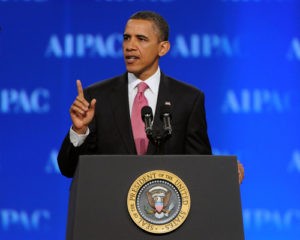I returned recently from AIPAC’s annual Policy Conference, held each year in Washington, D.C. With more than 10,000 attendees, AIPAC shattered its own records, growing the conference by nearly 50 percent in just a year. It attracted the largest gathering of Congress outside a joint session, and featured speeches from the leadership of both parties—Democrats and Republicans alike.
Three intensive days of plenaries, breakout sessions, policy discussions, community gatherings, and intimate receptions were capped off with an afternoon of lobbying on Capitol Hill, where 527 meetings were scheduled between House and Senate offices. If we make only one inference from this feat, it is that when it comes to strengthening the U.S-Israel relationship, this is AIPAC’s domain. No other organization—on the left or on the right—seeks to play this very specific role. No one comes close.
Minnesota’s Jewish community seems to agree. Our state, with its modestly sized, diverse community, is a keen example of AIPAC’s broad support.
Minnesota’s community delegation to Policy Conference nearly doubled in size since last year, and includes vociferous liberals, moderates, conservatives, and those somewhere in the middle on the political spectrum. What’s more, at a time when many in the pro-Israel community see America’s college campuses as an alarming source of anti-Israel animosity, it’s important to note that four consecutive student body presidents (none of whom are Jewish) from the University of Minnesota have attended Policy Conference. (This year there were more than 1500 students in attendance, 215 of whom were student body presidents at their colleges and universities.)
But Policy Conference wasn’t just about AIPAC’s role as the only true bipartisan organization in the pro-Israel community. It was also a vivid testament to the compelling reasons for why the U.S. and Israel are better together, why the American people and the Israeli people live better lives as a result of this alliance, and why a close partnership between both nations is essential to achieving Middle East peace.
For example, the founder of Agro Medical Technologies, based in northern Israel, demonstrated the ReWalk(tm), an electronic exoskeleton that enables otherwise-wheelchair-bound paraplegics to walk. Bernard Bar-Natan, the developer of The Emergency Bandage, which was used to save the lives of the victims of the shooting at Congresswoman Gabrielle Giffords’ event in Tucson, Arizona, demonstrated how his Israeli invention stops bleeding quickly without cutting off blood flow to limbs. For a struggling democracy surrounded by hostile nations, the fact that Israel produces more scientific research papers per capita than anywhere else in the world is astounding.
American and Israeli efforts at peacemaking together were also visible at Policy Conference. Democratic and Republican leaders alike endorsed direct talks between Israel and the Palestinian Authority, which the United States and Israel continue to support (while the Palestinian leadership refuses to even talk with Israel). President Obama noted in his speech that attempts to circumvent or undercut the peace process through a unilateral declaration of a Palestinian state at the United Nations will fail. And there was consensus among elected officials that attempts to deny Israel’s legitimacy or right to exist will not be tolerated. Supporting Israel’s security, so Israel has the flexibility it needs to take the necessary risks for peace, is essential.
Of course, the most significant cooperation between the US and Israel, as demonstrated at Policy Conference, is the two nations’ efforts to stop Iran from attaining a nuclear weapon. This fact was noted in virtually every speech at the conference, rightfully so, because a nuclear-armed Iran threatens more than Israel: it threatens the world.
Ultimately, this year’s Policy Conference marks a time when supporting the US-Israel alliance is more important than ever for America, for Israel, and for attaining stability in the region. AIPAC has proven itself, for five decades, to be the principal organization that can secure this important alliance.
AIPAC takes positions on issues of consensus in the pro-Israel community (such as stopping a nuclear armed Iran, and supporting the two-state solution through peace talks), and urges differences between the U.S. and Israel to be ironed out in private. Because of this focus, AIPAC is admired by Democrats, Republicans, Jews, Christians, atheists, Hispanic/Latinos, African Americans, and so many more. Unlike other organizations, AIPAC has never in its history endorsed or rated candidates for office, so it’s never on the losing side of an election. And since it very strictly avoids social or cultural wedge issues, it truly unites the mainstream pro-Israel community in the US.
If you want to join me and hundreds of other Minnesotans in transforming a passion for these issues into direct political action, consider attending the 2011 AIPAC Minnesota Annual Event, which will be held June 29, 2011 at the Hilton Minneapolis. Featuring Governor Mark Dayton—a true friend of the U.S.-Israel alliance—the event will not only underscore the work we need to do in pursuit of Middle East peace, but more importantly, provide a path we need to get involved. See you there.
(Photo: AIPAC)



